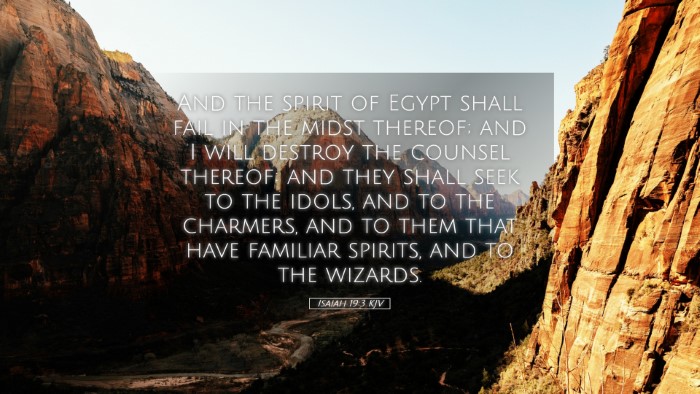Isaiah 19:3 - Commentary and Insights
Bible Verse: "And the spirit of Egypt shall fail in the midst thereof; and I will destroy the counsel thereof: and they shall seek to the idols, and to the charmers, and to them that have familiar spirits and to the wizards."
Introduction
Isaiah 19:3 presents a vivid picture of the spiritual and social instability that would engulf Egypt. This verse is a part of a larger prophetic message concerning Egypt, addressing its decline under the judgment of God. In this commentary, we explore the insights from esteemed public domain commentators such as Matthew Henry, Albert Barnes, and Adam Clarke to provide a comprehensive understanding of this scripture.
Context of the Verse
The prophecy against Egypt unfolds in Isaiah 19, detailing a time of desolation and disruption. The nation is depicted as a former stronghold that will experience a collapse due to divine judgment. The preceding verses highlight political unrest, calamity, and a loss of national identity, leading to a search for answers amongst false idols and spiritual frauds.
Commentary Insights
Matthew Henry's Perspective
Matthew Henry emphasizes the futility of seeking guidance from false gods in times of crisis. He interprets the phrase "spirit of Egypt shall fail" as an indication of both national demise and spiritual bankruptcy. The reliance on charmers, familiar spirits, and wizards reveals a fundamental departure from true faith, illustrating how desperation leads to empty pursuits.
- Despair in Leadership: Henry notes that the counsel of rulers will fail, indicating that even those in positions of authority will be bereft of wisdom.
- Deception of Idolatry: The mention of idols and wizards stresses the delusion that grips Egypt when they turn away from God.
Albert Barnes' Commentary
Albert Barnes focuses on the implications of this spiritual failure. He highlights that as Egypt loses confidence in its false systems, it will turn to what is ultimately impotent, revealing the intense desperation of the people. He asserts that the phrase "shall seek" indicates a vigorous, although misplaced, pursuit of understanding in times of distress.
- Failure of Religion: Barnes asserts that the people of Egypt will realize the inadequacy of their religious practices when confronted with their trials.
- Condemnation of Sorcery: He underscores the condemnation of sorcery and the reliance on wizards, presenting these as further signs of national decline.
Adam Clarke's Analysis
Adam Clarke provides a detailed exegesis of the text, emphasizing the socio-religious context of Egypt. He articulates that the spirit of Egypt refers not only to the collective psyche of the nation but also to the spirit of idolatry that permeates its culture. Clarke establishes a connection between the failure of the national spirit and the spiritual blindness that leads the populace to witchcraft and divination.
- Symbol of Loss: Clarke discusses the idea of the breakdown of communal spirit as a loss that reflects on the national identity and the individual’s relationship with God.
- Desperation and Witchcraft: His commentary connects the rise of witchcraft and demonic practices with the ultimate despair of a people who have forsaken their faith.
Theological Implications
The theological implications of Isaiah 19:3 extend beyond the immediate context of Egypt. The failure of Egypt serves as a reminder of the dangers of relying on anything other than God for guidance. The text challenges readers, especially pastors and theologians, to ponder the consequences of spiritual adultery and the pursuit of false comforts.
Spiritual Reflections
- Reliance on God: The desperate search of the Egyptians for wizards highlights the necessity for believers to anchor their hopes solely in God, particularly in crises.
- Warning Against Idolatry: This verse serves as a caution against succumbing to the modern-day idols that distract individuals from their faith.
- Community and Counsel: The idea that even the wise will be confounded promotes an understanding of the importance of godly wisdom and spiritual counsel in a community of faith.
Conclusion
Isaiah 19:3 encapsulates a profound truth regarding human nature and the perils of forsaking God for the illusions of secular wisdom and idolatry. By drawing from the insights of Matthew Henry, Albert Barnes, and Adam Clarke, we gain a richer understanding of the text, its historical significance, and its timeless relevance. As pastors and theologians reflect on this verse, they are encouraged to lead their congregations towards genuine faith and reliance on God’s guidance amidst the myriad of falsehoods that the world offers.


